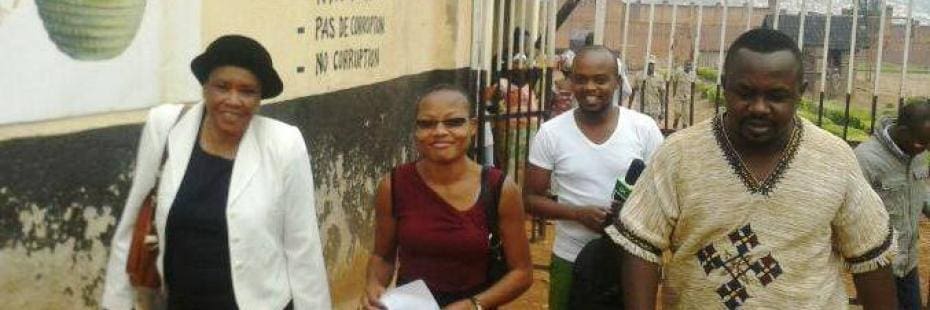Two Rwandan women who were jailed for their independent journalism are now free and courageously pursuing their reporting work – after MLDI succeeded in getting their sentences reduced. But the fight continues on an international level to set a precedent that could help other journalists who are threatened under Rwanda’s criminal defamation and national security laws.
In 2010, Agnès Uwimana Nkusi was ordered to serve 17 years in jail for undermining national security, “minimising” the genocide and for defaming the Rwandan president, Paul Kagame, as a result of reports in her newspaper, Umurabyo, that were critical of government policy.
Her colleague, reporter Saidati Mukakibibi, received a seven-year sentence for her work in the same newspaper. Their articles had criticised government policy, corruption gacaca court system, through which justice was dispensed for genocidaires.
The newspaper had previously been warned by Rwanda’s government-appointed Media Council to tone down its coverage. We provided financial and legal support for their appeal, and our lawyers flew out to plead before the Supreme Court on human rights and freedom of expression grounds.
This had an immediate impact – the pair were acquitted of the most serious charges of ‘minimising the genocide’ and had their sentences reduced. Saidati was freed in June 2013 and Agnès left prison in June 2014. Agnès says: “I’m very happy to have left prison and I’m going to pursue my journalism career. I’m not afraid and I have no regrets.”
A journalist for the past 12 years, Saidati Mukakibibi has now returned to work, writing for the newspaper Mont Jali anniversary. She says:
“As I walked free from prison, I immediately told people that I will with courage. I love this profession – it’s my means of expressing myself. It’s a relief. Journalists work in fear, worrying they will be jailed or killed. Defamation is still a criminal offence and it’s used as a weapon to silence us.”
The two journalists were locked up at Kigali’s notorious ‘1930’ prison and spent their days alongside confessed genocidaires as well as other women, some as old as 90, who say there were no grounds for their arrest. Saidati adds:
“I feel proud to have been jailed for exercising my freedom of expression – and for having given others the opportunity to express their opinions. MLDI visited us in prison. I was very moved by that and I’m still very grateful to them.”
Nani Jansen, MLDI’s Legal Director, says: “Rwanda has a deteriorating media climate. We used to support many cases there, and there are hardly any at the moment – which I and human rights experts take as a sign that the government has been effective in its campaign to silence a free press.”
We have now taken the two journalists’ case to the African Commission on Human and Peoples’ Rights, arguing that their rights to a fair trial and freedom of expression were violated. We hope that a ruling from the Commission will have a long-term impact in Rwanda by limiting the use of national security and criminal defamation laws against journalists.
The case before the African Commission is ongoing and the journalists are represented by Nani Jansen, John Jones QC and Evaliste Nsabayezu, a Rwandan lawyer. Saidati Mukakibibi concludes: “We remain optimistic. With time, everything will work out.”
Recent Case Studies
In Rwanda, we helped free two journalists from jail
The precarious state of press freedom in Turkey, entwined with a deteriorating democratic environment, poses significant challenges to journalists. Increasingly they face arbitrary arrests, legal threats, and increasing violence in their pursuit of reporting truth. In response to these threats, the Media and Law Studies Association (MLSA), our partner, actively defends press freedom and human […]
In Rwanda, we helped free two journalists from jail
23 October 2023 marks one year since the killing of prominent Pakistani journalist and news anchor for Pakistani broadcaster, ARY News, Arshad Sharif. Sharif was fatally shot at close range by Kenyan Police at a roadblock near Nairobi. To this day, a transparent, independent and effective investigation into the circumstances of his death has not […]
In Rwanda, we helped free two journalists from jail
November 2nd marks the International Day to End Impunity for Crimes Against Journalists. The threats and dangers that constitute a stark reality for many journalists reinforce the importance of this day. Every year journalists are killed, tortured, and harassed for carrying out their work. Over 1,600 journalists have been killed since 2003 with a sharp […]



